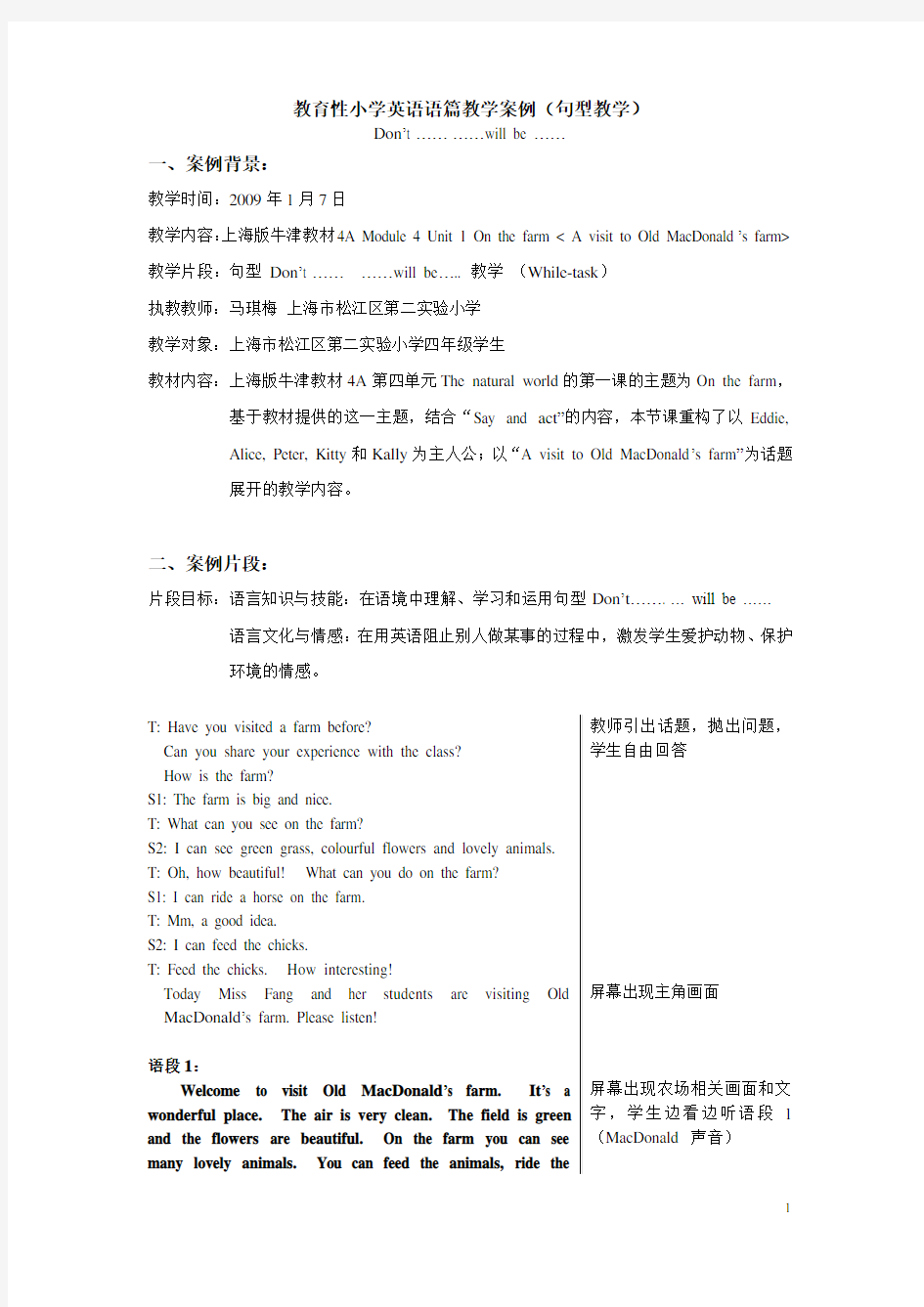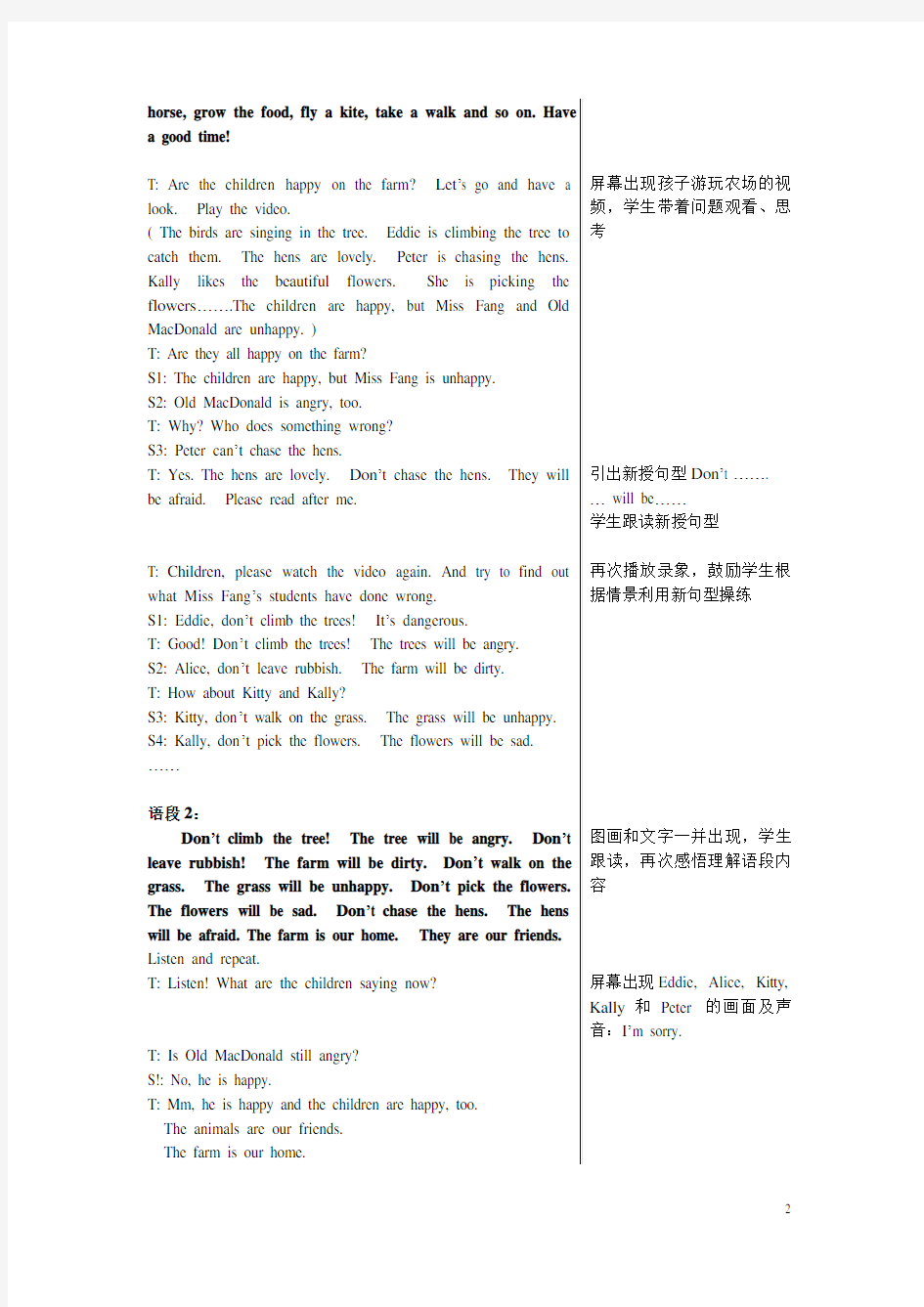教育性小学英语语篇教学案例(句型教学)


教育性小学英语语篇教学案例(句型教学)
Don’t …………will be ……
一、案例背景:
教学时间:2009年1月7日
教学内容:上海版牛津教材4A Module 4 Unit 1 On the farm < A visit to Old MacDonald’s farm> 教学片段:句型Don’t …………will be….. 教学(While-task)
执教教师:马琪梅上海市松江区第二实验小学
教学对象:上海市松江区第二实验小学四年级学生
教材内容:上海版牛津教材4A第四单元The natural world的第一课的主题为On the farm,基于教材提供的这一主题,结合“Say and act”的内容,本节课重构了以Eddie,
Alice, Peter, Kitty和Kally为主人公;以“A visit to Old MacDonald’s farm”为话题
展开的教学内容。
二、案例片段:
片段目标:语言知识与技能:在语境中理解、学习和运用句型Don’t……. … will be ……
语言文化与情感:在用英语阻止别人做某事的过程中,激发学生爱护动物、保护
环境的情感。
T: Have you visited a farm before?
Can you share your experience with the class?
How is the farm?
S1: The farm is big and nice.
T: What can you see on the farm?
S2: I can see green grass, colourful flowers and lovely animals. T: Oh, how beautiful! What can you do on the farm?
S1: I can ride a horse on the farm.
T: Mm, a good idea.
S2: I can feed the chicks.
T: Feed the chicks. How interesting!
Today Miss Fang and her students are visiting Old MacDonald’s farm. Please listen!
语段1:
Welcome to visit Old MacDonald’s farm. It’s a wonderful place. The air is very clean. The field is green and the flowers are beautiful. On the farm you can see many lovely animals. You can feed the animals, ride the 教师引出话题,抛出问题,学生自由回答
屏幕出现主角画面
屏幕出现农场相关画面和文字,学生边看边听语段1(MacDonald 声音)
horse, grow the food, fly a kite, take a walk and so on. Have a good time!
T: Are the children happy on the farm? Let’s go and have a look. Play the video.
( The birds are singing in the tree. Eddie is climbing the tree to catch them. The hens are lovely. Peter is chasing the hens. Kally likes the beautiful flowers. She is picking the flowers…….The children are happy, but Miss Fang and Old MacDonald are unhappy. )
T: Are they all happy on the farm?
S1: The children are happy, but Miss Fang is unhappy.
S2: Old MacDonald is angry, too.
T: Why? Who does something wrong?
S3: Peter can’t chase the hens.
T: Yes. The hens are lovely. Don’t chase the hens. They will be afraid. Please read after me.
T: Children, please watch the video again. And try to find out what Miss Fang’s students have done wrong.
S1: Eddie, don’t climb the trees! It’s dangerous.
T: Good! Don’t climb the trees! The trees will be angry.
S2: Alice, don’t leave rubbish. The farm will be dirty.
T: How about Kitty and Kally?
S3: Kitty, don’t walk on the grass. The grass will be unhappy. S4: Kally, don’t pick the flowers. The flowers will be sad. ……
语段2:
Don’t climb the tree! The tree will be angry. Don’t leave rubbish! The farm will be dirty. Don’t walk on the grass. The grass will be unhappy. Don’t pick the flowers. The flowers will be sad. Don’t chase the hens. The hens will be afraid. The farm is our home. They are our friends. Listen and repeat.
T: Listen! What are the children saying now?
T: Is Old MacDonald still angry?
S!: No, he is happy.
T: Mm, he is happy and the children are happy, too.
The animals are our friends.
The farm is our home. 屏幕出现孩子游玩农场的视频,学生带着问题观看、思考
引出新授句型Don’t ……. … will be……
学生跟读新授句型
再次播放录象,鼓励学生根据情景利用新句型操练
图画和文字一并出现,学生跟读,再次感悟理解语段内容
屏幕出现Eddie, Alice, Kitty, Kally和Peter 的画面及声音:I’m sorry.
三、案例分析:
小学英语语篇教学中教育性元素的激发和渗透
教材语言分析:
牛津教材4B Module 4 Unit 1 Say and act 关于A visit to Old MacDonald’s farm话题的主要句型是:Don’t …… I’m sorry. That’s all right. 本案例基于教材提供的内容,挖掘其中的教育性元素。以农场之旅为主线,在情景中发现问题,寻找答案;以拟人化的口吻,丰富语言内容,把原本生硬的语言变得很柔和,把强制的命令变得更易接受,使学生懂得动植物生命的可贵,保护环境的重要。
教学目标设定:
依据学生的年龄特点和认知水平,根据课标要求,结合本课主题内容,本节课设定的语言目标是会用祈使句发出指令Don’t ……告诉别人不应该做某事;教育性目标是让学生在看录象和讨论的过程中,把植物赋予生命,通过人类化的一些感受:angry, unhappy, sad, afraid 等,唤醒学生内心的那份保护动物、保护环境的情感。
教学情景选择:
在设计本课时,更多的关注是人和动植物感受的变化,对于Miss Fang的一群学生来说,由起初开始农场之旅的兴奋,到来到农场的忘乎所以,不经意之间给农场带来了很多不和谐的音符,通过Miss Fang 和Old MacDonald 富有感染力的劝说唤起他们的内心感悟;对于动植物来说,原先安静的生活环境,由于一群孩子的到来,发生了变化,通过人类化的口吻……will be sad / angry ……在这样自然而有熟悉的情景中渗透教育性元素。
教学内容再构:
根据对教材内容的分析,以及教学设计的考虑,对原有材料进行了重新处理,再构了如下语段:
Welcome to visit Old MacDonald’s farm. It’s a wonderful place. The air is very clean. The field is green and the flowers are beautiful. On the farm you can see many lovely animals. You can feed the animals, ride the horse, grow the food, fly a kite, take a walk and so on. Have a good time!
Don’t climb the tree! The tree will be angry. Don’t leave rubbish! The farm will be dirty. Don’t walk on the grass. The grass will be unhappy. Don’t pick the flowers. The flowers will be sad. Don’t chase the hens. The hens will be afraid. The farm is our home.They are our
friends.
教学活动设计:
1.环境对比渲染促思考
Old MacDonald 的农场对于生活在城市的学生来说是一个神秘的地方,他们对农场的了解也往往停留书本杂志的介绍,但真的身临其境了会有一种新鲜而有兴奋的感觉,课堂中通过生动的电视画面向学生展示一个美丽的农场,那里绿树成荫、动物自由自在的生活,尽现一副美妙的景象。但伴随着孩子的到来,绿草被践踏、母鸡受到惊吓、花儿失去“笑容”、树木被折断枝干、农场受到垃圾侵蚀……很多不和谐的音符破坏了动物的家园、植物的家园,在这种强烈环境的对比渲染下,很自然的能引发学生内心的那份真切而自然的情感,Don’t …………will be……的语言内容在这样的情景中引出和操练,让学生觉得有话可说,有话想说,既易于理解也易于接受。
2.感受拟人手法尽抒发
在整节课的设计和开展中,除了环境变化这一主线外,还花了很多笔墨在“感受变化”上的刻画。Peter, Alice, Kally…他们的心情从起初的excitin g → happy → ashamed, 而动植物从原先的free → unhappy, 在孩子和动植物截然相反的感受对比happy → unhappy 中让学生自己领悟到自己的行为的错误之处。另外四年级的学生说大不大,他们的说教需要委婉而不能强塞;他们说小不小,道理的灌输需要有说服力。正是考虑了学生的认知水平和年龄特点,在设计课时用拟人化的手法,把母鸡、草、树、花……赋予生命,让他们用人类的口吻,表达它们自己的内心感受,在富有童趣的内容呈现过程中,孩子们怜惜植物、爱惜动物的内心情感自然而然的得以点燃,教育性元素在语段教学中很好的被激发。
